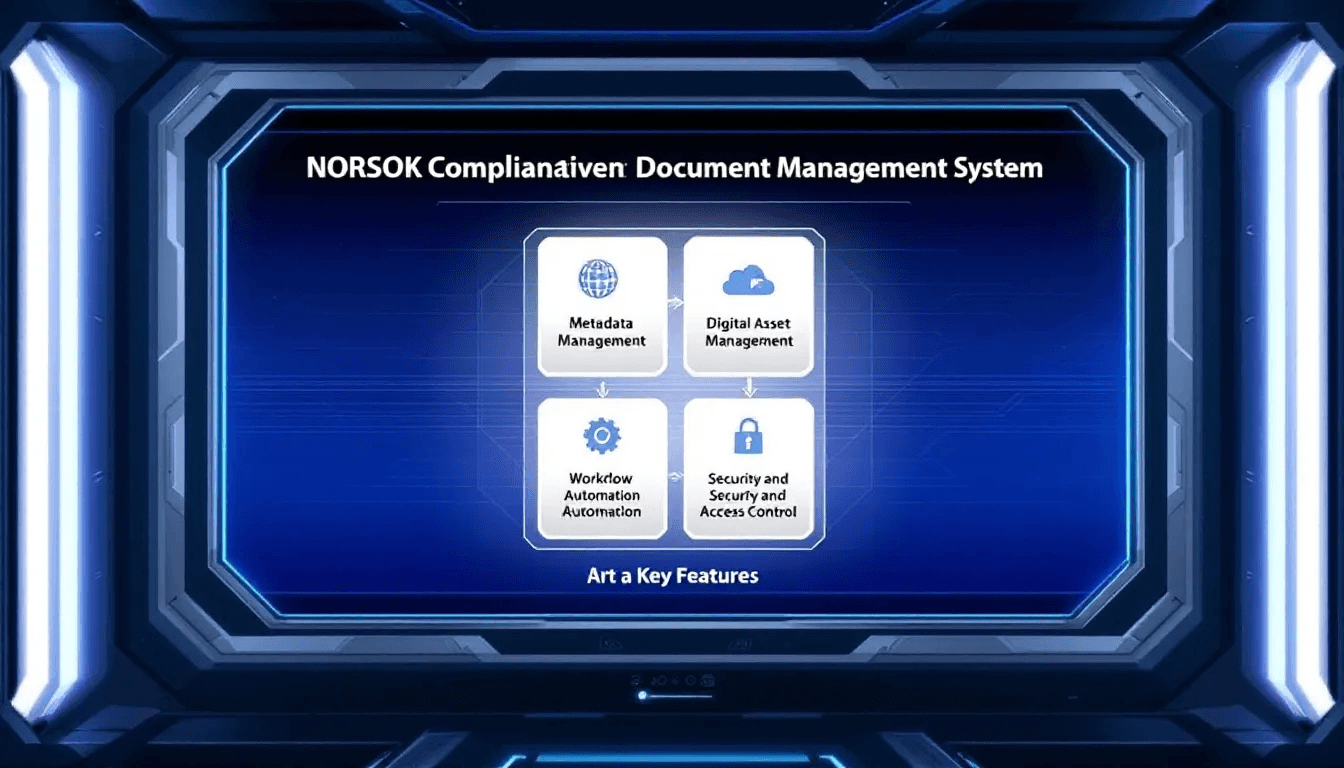Basics
Optimizing Compliance with a Norsok Compliant Document Management System
Oct 26, 2024

Optimizing Compliance with a Norsok Compliant Document Management System
For petroleum industry professionals, a NORSOK compliant document management system with robust document control ensures compliance with stringent safety standards and enhances operational efficiency. This article will break down the essential features such a system offers and show how it can streamline your document management processes, ensuring you stay ahead in a competitive industry.
Key Takeaways
NORSOK standards, vital for safety and competitiveness in the Norwegian petroleum industry, require adherence to rigorous documentation and procedural guidelines to maintain compliance.
A NORSOK compliant Document Management System (DMS) enhances efficiency through features such as metadata utilization, access control mechanisms, and revision control systems, significantly improving document retrieval and security.
Implementing a modern DMS like Limber streamlines document workflows and supports SMEs in maintaining compliance, reducing administrative burdens, and enhancing operational efficiency while fostering accountability.
Inspection certificates are crucial for maintaining compliance with NORSOK standards, ensuring that all equipment and processes meet the required specifications and safety regulations.
Understanding NORSOK Standards for Document Management

NORSOK standards, managed by Standards Norway with input from various industry stakeholders, are designed to ensure safety and enhance the competitiveness of the Norwegian petroleum industry. These standards serve as a common reference point in the regulatory authorities’ regulations, aiming to provide a unified framework for safety and operational procedures. With approximately 79 active NORSOK standards currently in use, staying current with these guidelines is crucial for maintaining compliance and ensuring the safety and efficiency of operations.
The NORSOK standards are not just limited to Norway; they have gained international recognition and are used globally to enhance safety and operational efficiency. This international adoption underscores the robustness and reliability of these standards, making them a critical component of the regulatory framework for the norwegian continental shelf. Maintaining real-time updates in revision control systems is essential for adapting to the periodic changes in the norsok standard, thereby ensuring continuous compliance.
However, the complexity of these standards can be daunting. From rules, regulations and policies to specific documentation requirements, the NORSOK standards cover a broad spectrum aimed at improving safety and competitiveness in the petroleum industry.
This is why it’s essential to have a document management system that not only helps you stay compliant but also streamlines the entire process, making it easier to manage and retrieve essential documentation.
Key Features of a NORSOK Compliant Document Management System

A NORSOK compliant document management system is designed to store essential documentation such as historical data, inspection certificates, and certificates of conformity. These systems are built to ensure that all documentation is easy to find and work with, facilitating compliance and operational efficiency. Communication between suppliers and clients in complex projects can be challenging, especially when dealing with hundreds of documents, each potentially with numerous revisions. This is where a robust document management system proves invaluable.
Three key features define a NORSOK compliant DMS: metadata utilization, access control mechanisms, and revision control systems. These features not only enhance safety and compliance but also improve operational efficiency and cost-effectiveness within the petroleum industry. Let’s delve into each of these features to understand their significance and benefits.
Metadata Utilization
Metadata is the backbone of an efficient document management system, enhancing document retrieval, search, and organization by categorizing documents. This model is easy to govern and maintain, providing significant advantages in document management. By utilizing metadata, users can quickly search and navigate through documentation, improving organization and retrieval.
Additionally, metadata-based software models enhance document retrieval speed, making it easier for users to find necessary information. They also improve access control by providing detailed tracking of document interactions, ensuring secure and compliant handling of documentation.
Access Control Mechanisms
Access control mechanisms are essential for ensuring the secure and compliant handling of documents in a document management system. These mechanisms allow organizations to manage document permissions and visibility, ensuring that only authorized users can access sensitive information. Metadata-based models further enhance access control by providing a framework to manage document permissions and visibility effectively.
Implementing robust access control mechanisms ensures secure handling of documentation and compliance with regulatory requirements. This not only enhances overall security but also fosters a culture of accountability and transparency within the organization.
Revision Control Systems
Revision control systems are crucial for maintaining the integrity and accuracy of documentation. It’s essential for collaboration across organizations to document and communicate revisions in real time. This assurance helps ensure effective teamwork. Automatic triggering of revision updates based on workflows ensures that everyone is working with the latest version of the document, reducing the risk of errors and outdated information.
Effective revision control systems provide confidence in working on the latest revision with traceability, ensuring that all changes are tracked and documented. This mitigates the risk associated with traditional document control systems, where there is a possibility of working with an outdated revision.
A robust revision control system enhances operational efficiency and ensures compliance with NORSOK standards.
Benefits of Using a NORSOK Compliant DMS

The implementation of a NORSOK compliant Document Management System offers numerous benefits, enhancing competitiveness and operational efficiency in the petroleum industry. These systems ensure adherence to industry standards, thereby boosting the competitive position of organizations. The benefits of using such a system can be broadly categorized into three areas: enhanced safety and compliance, cost efficiency, and improved operational efficiency.
Ensuring that all documentation and processes meet applicable NORSOK standards significantly reduces the risk of non-compliance and associated penalties. This not only enhances safety but also fosters a culture of accountability and transparency.
Furthermore, the cost savings achieved through efficient document handling and reduced administrative burdens contribute to the overall competitiveness cost effectiveness of the organization.
Enhanced Safety and Compliance
The NORSOK Z-015 standard emphasizes safety and compliance in the offshore industry, requiring rigorous documentation of equipment and processes. A compliant document management system allows organizations to customize checklists to include their specific requirements alongside existing standards, ensuring comprehensive compliance. This customization reduces the risk of accidents and enhances operational safety.
Moreover, a modern, optimized document management system reduces costs and increases margins, allowing organizations to focus on their core operations while ensuring compliance with applicable regulations and procedures. This dual benefit of enhanced safety and cost efficiency makes a NORSOK compliant DMS an invaluable asset for any organization operating in the petroleum industry.
Cost Efficiency
A compliant DMS can significantly lower costs associated with document management by reducing the time spent searching for documents. Streamlining document handling and compliance processes leads to cost efficiency, essential for improving competitiveness in the petroleum industry. The time saved and the reduced administrative burden translate into lower operational costs and higher profit margins.
Furthermore, by ensuring that documents are easily accessible and up-to-date, a compliant DMS enhances overall confidence and focus within the organization. This allows companies to allocate resources more effectively, thereby improving their competitiveness in the market.
Improved Operational Efficiency
The utilization of a compliant DMS streamlines document workflows, thereby boosting overall operational effectiveness. Efficient workflows reduce the time spent on document retrieval and handling, allowing operators to focus on core activities and strategic initiatives. This improvement in operational efficiency directly contributes to the competitiveness of the organization.
For SMEs in particular industries, Limber aids in simplifying regulatory documentation processes, promoting efficiency and reducing administrative burdens. Leveraging a compliant DMS ensures well-organized operations aligned with industry standards, enhancing competitive edge.
Limber: A Cloud-Native Solution for SMEs

Limber operates as a fully cloud-based platform, facilitating document management without requiring additional software installation. This cloud-native architecture allows Limber to scale easily, providing flexibility in deployment for small and medium enterprises (SMEs). Limber combines a SaaS Business Operating System with hands-on digital transformation services, providing a comprehensive solution for the unique needs of SMEs in complex engineering markets.
Limber is suitable for smaller organizations, organizations that value continuous support, and growth-oriented organizations. The platform’s transparent pricing structure, with a base fee plus a per-user fee, ensures that SMEs can manage their documentation needs cost-effectively.
Deploying Limber helps SMEs achieve lean processes for documentation burden, retaining high profit margins.
Lean Internal Processes
Having lean internal processes for regulatory documentation burden is vital for Small and Medium Enterprises (SME) suppliers. Limber helps achieve this by reducing the complexity and administrative burden associated with document management. Streamlined documentation processes allow SMEs to focus on core operations and strategic initiatives.
The cloud-native architecture of Limber ensures that all documentation is easily accessible and manageable, promoting efficiency and reducing the risk of errors. This lean approach to internal processes not only enhances operational efficiency but also contributes to overall competitiveness in the market.
Quality Controlled Workflows
Limber offers quality controlled workflows that assign actions to users, ensuring accountability and clarity in operations. Each task within the workflow is assigned to specific users, promoting a sense of responsibility and ensuring that all tasks are completed efficiently. This approach enhances collaboration across departments and organizations, leading to improved operational performance.
Automated task assignments within Limber ensure that progress is tracked throughout document handling, reducing the risk of errors and missed deadlines. Streamlined document management processes with Limber enable quicker decision-making and enhanced collaboration, contributing to organizational success.
High-Quality Data and Dashboards
High-quality data is automatically generated from Limber usage, resulting in constantly updating graphs for decision making. These dashboards leverage this high-quality data to provide real-time insights for users, enhancing informed decision-making. The importance of high-quality data for maintaining compliance and efficiency in document management systems cannot be overstated.
Presenting high-quality, timely data on Limber’s dashboards allows users to make informed decisions quickly and accurately. This real-time insight is crucial for maintaining operational efficiency and ensuring compliance with regulatory requirements.
Implementation and Support with Limber

Limber’s implementation process includes setting aligned goals and engaging stakeholders for effective deployment. The process is designed to ensure that the system meets the specific needs of the organization, promoting a smooth and efficient implementation. Limber follows a three-step transform process: Goal Alignment, Stakeholder Interviews, and Implementation Scope.
Limber provides custom optimization of workflows, advanced EPCI project start service, recurring tailored training sessions, and prioritized support and assistance. This comprehensive support ensures that organizations and suppliers can maximize the benefits of the equipment and achieve a rapid return on investment.
Goal Alignment and Stakeholder Interviews
Aligning organizational objectives is a crucial first step in Limber’s implementation process. Initial discussions with stakeholders are conducted to gather insights and align the software implementation with organizational goals. The purpose of these stakeholder interviews is to ensure that input from all key stakeholders is considered, ensuring that everyone is heard and their needs are addressed.
This alignment process ensures that the deployment of the system supports the organization’s growth objectives and addresses specific challenges. Taking into account the unique needs of the organization ensures a tailored and effective implementation process with Limber.
Dedicated Account Manager
A dedicated account manager is assigned to each client to deliver customized support and enhance the implementation experience. This account manager acts as the primary point of contact, ensuring personalized support and understanding of customer requirements. Providing prioritized support and tailored assistance, the dedicated account manager plays a crucial role in the system’s successful deployment.
The dedicated account manager ensures that any issues or challenges encountered during the implementation are addressed promptly and effectively. This level of personalized support helps to build a strong relationship between the client and Limber, fostering a collaborative environment that enhances the overall implementation experience.
Self-Service Resources
Limber offers a range of self-service materials, including articles, videos, and tutorials, to support ongoing user education. These resources empower users to take charge of their learning and improve their proficiency with the document management system. Comprehensive self-service resources from Limber ensure users have the tools needed to effectively utilize the system.
These self-service resources are designed to enhance the understanding and use of the system, ensuring that users can maximize the benefits of their document management processes. This ongoing support is crucial for maintaining compliance and operational efficiency, as it allows users to stay up-to-date with best practices and system updates.
Final thoughts & Wrap up
Managing orders and projects with rigorous documentation requirements using outdated or manual tools can lead to plummeting margins and increased risks of failed deliveries and penalties. The NORSOK documentation requirements aim to improve safety and collaboration but can simultaneously become an overhead and burden to SMEs and operators.
This is where modern, cloud-based EDMS systems like Limber come into play. Limber ensures a lean documentation flow, helping organizations retain high margins while maintaining compliance with NORSOK standards. Streamlining document management processes and providing robust support and resources, Limber enhances organizations’ operational efficiency and competitiveness.
The result is a more efficient, compliant, and competitive organization ready to improve competitiveness and meet the challenges of the petroleum industry.
Summary
In summary, a NORSOK compliant Document Management System (DMS) is essential for organizations operating in the Norwegian petroleum industry. By ensuring adherence to NORSOK standards, these systems enhance safety, compliance, cost efficiency, and operational efficiency. The key features of a compliant DMS, such as metadata utilization, access control mechanisms, and revision control systems, play a crucial role in achieving these benefits.
Limber, a cloud-native solution, provides a comprehensive and scalable platform for SMEs to manage their documentation needs effectively. With lean internal processes, quality controlled workflows, and high-quality data dashboards, Limber ensures that organizations can maintain compliance, enhance efficiency, and improve competitiveness. By leveraging Limber’s implementation and support resources, organizations can achieve a rapid return on investment and stay ahead in the competitive petroleum industry.
Frequently Asked Questions
What are NORSOK standards?
NORSOK standards are essential guidelines that were developed to ensure safety and improve competitiveness within the Norwegian petroleum industry. They serve as a common reference for regulatory compliance and are recognized internationally.
How does a NORSOK compliant DMS enhance safety and compliance?
A NORSOK compliant DMS enhances safety and compliance by implementing stringent documentation and processes that minimize accident risks and allow for tailored checklists that address specific requirements in conjunction and accordance with existing standards.
What makes Limber suitable for SMEs?
Limber is particularly suitable for SMEs due to its cloud-native architecture that offers scalability and flexibility in deployment, catering to the needs of smaller organizations focused on continuous support and growth.
What support does Limber offer during implementation?
Limber offers comprehensive support during implementation, including expertise in custom workflow optimization, advanced project start services, recurring tailored training sessions, and prioritized assistance through a dedicated account manager for personalized care.
What self-service resources does Limber provide?
Limber provides a variety of self-service resources such as articles, videos, and tutorials, which empower users to enhance their proficiency with the document management system independently. This comprehensive support facilitates ongoing user education and self-directed learning.
